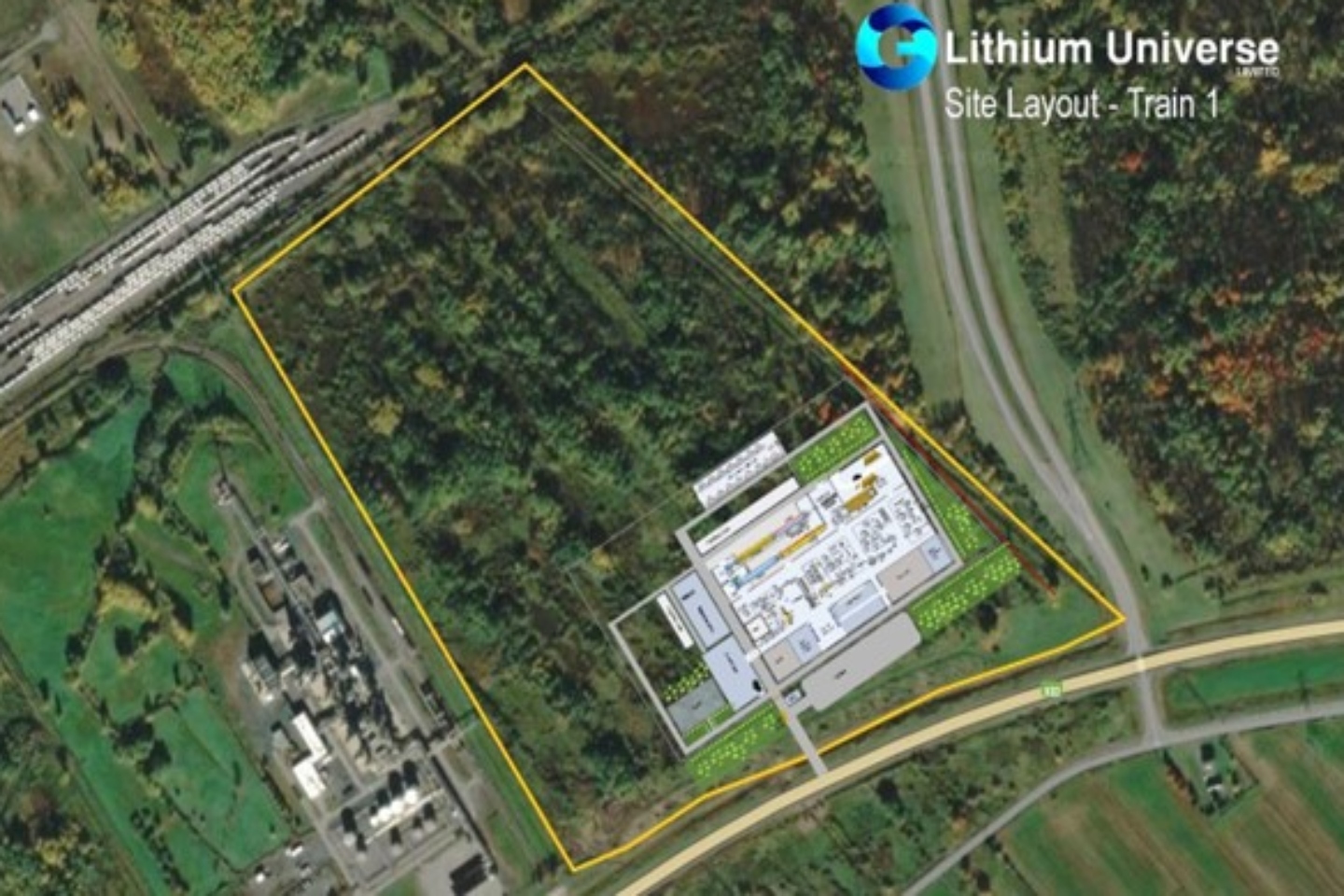Lithium Universe has secured a prime location for its proposed battery-grade lithium carbonate refinery in Canada after executing an option agreement to purchase a commercial property in the province of Quebec. The location for the facility is between Quebec City and Montreal at the Bécancour Industrial Waterfront Hub, with heavyweight engineering firm Hatch to undertake a comprehensive study for the refinery’s design.


Lithium Universe has secured a prime location for its proposed battery-grade lithium carbonate refinery in Canada after executing an option agreement to purchase a commercial property in the province of Quebec.
The facility is located between Quebec City and Montreal at the Bécancour Industrial Waterfront Hub, with heavyweight engineering firm Hatch to undertake a comprehensive study for the refinery’s design. The decision to nail down the location reflects the company’s commitment to its hub strategy in an emerging lithium jurisdiction.
Lithium Universe chief executive officer Alex Hanly said the fact that there were currently no operational refineries in North America – and only about four planned to come into production by 2028 – was simply “too hard to ignore”.
The study will outline the infrastructure requirements for a 16,000 tonnes per annum lithium carbonate refinery, in addition to the definitive estimated capital and operating costs. The design will include the use of conventional kiln conversion of spodumene, sulphuric acid sulphation and leaching, impurity removal and final purification to battery-grade quality lithium carbonate – similar to the Jiangsu Lithium Carbonate Plant.
The company has opted for a lithium carbonate refinery instead of a lithium hydroxide refinery because of the widespread use of the concentrate in lithium iron phosphate (LFP) batteries. Management says LFP batteries are increasingly used in electric vehicles (EVs) because of lower costs, a longer shelf life and superior stability when compared with lithium hydroxide.
Management says more than 20 sites were considered for the new plant, with a focus on the availability of flat land, access to infrastructure such as rail, road and port facilities and access to a labour supply for construction operation and maintenance. Also, part of the decision-making process was the consideration of First Nations interests and access to power, water and geological and geographic suitability.
Four sites were shortlisted, with the Bécancour Industrial Park deemed the most favourable due to its location near the General Motors (GM) and Korea-based POSCO Chemicals’ new C$500 million (AU$558 million) cathode active material (CAM) factory that is predicted to kick off first production next year.
Lithium Universe chairman Iggy Tan said: “This is just another positive step forward for the Company as we secure this key landholding in the most attractive emerging battery-focussed jurisdiction. One of the reasons we like the site is that it gives us the opportunity to expand. We have the ability to do that if necessary.”
Management says Canada's recent focus on investing in battery plants, backed by collaborations with Volkswagen, Stellantis, LG Energy Solution, and Northvolt, aims to safeguard its auto sector, potentially creating 250,000 jobs and contributing C$48 billion (AU$54.4 billion) annually to the economy by 2030.
The increase in battery plant activity is expected to build on plans in the United States, with more than 20 major manufacturers predicted to deploy an estimated 900GW of battery capacity by 2028. Lithium Universe says by 2030, Georgia, Kentucky, and Michigan are poised to dominate EV battery production in the US and will be joined by key players such as Kansas, North Carolina, Ohio, and Tennessee.
Currently, the company is focussed on the exploration and associated development of its Apollo lithium project in Canada’s renowned James Bay area. The operation in the province of Quebec covers about 240 square kilometres and includes 466 claims.
The site is considered a greenfield project with limited historical exploration. Quebec’s Ministry of Natural Resources and Forests has identified a total of 17 outcrops on the property as being dominantly pegmatite-hosted.
Apollo was staked early last year by a private owner and is on the same trend as and adjacent to ground owned by Patriot Battery Metals and Winsome Resources – both of which have hit thick, shallow and high-grade coarse spodumene mineralisation during drilling.
Patriot’s Corvette deposit holds an inferred resource of 109.2 million tonnes at 1.42 per cent lithium oxide and 160 parts per million tantalum oxide. Drilling at the site has returned some impressive hits including 156m at 2.12 per cent lithium oxide.
Winsome has its Adina deposit about 20km east of Apollo, where it has returned best drill results of 107m grading 1.34 per cent lithium oxide from just 2.3m.
And with Lithium Universe’s latest commitment, it has clearly stamped its strategy to try and play a key role in helping close the North American lithium processing gap.
Is your ASX-listed company doing something interesting? Contact: matt.birney@businessnews.com.au












